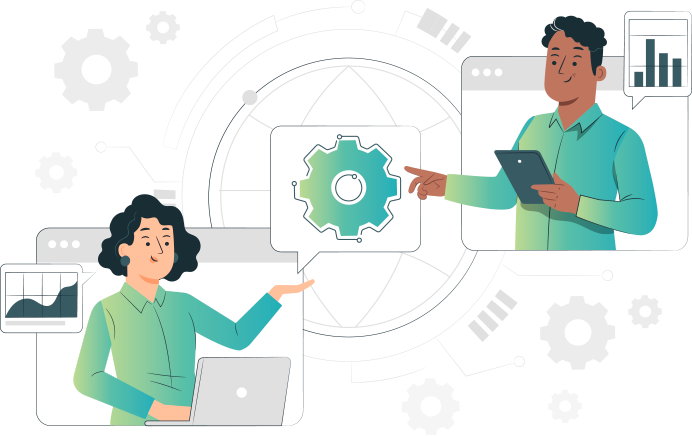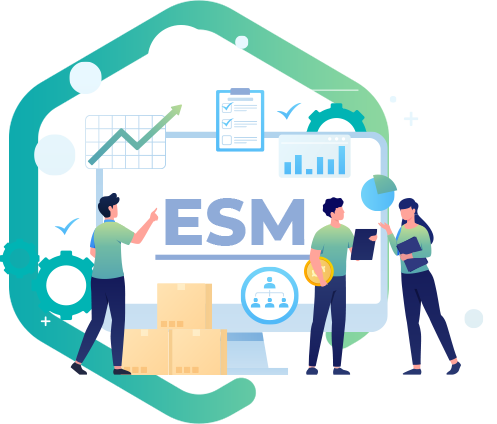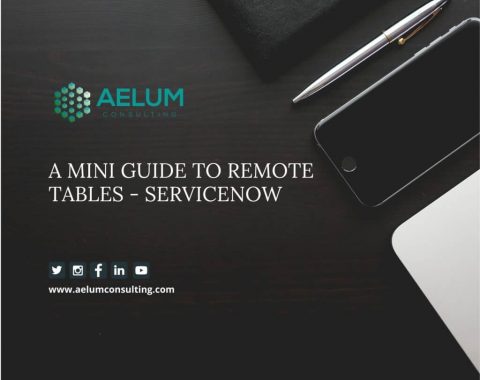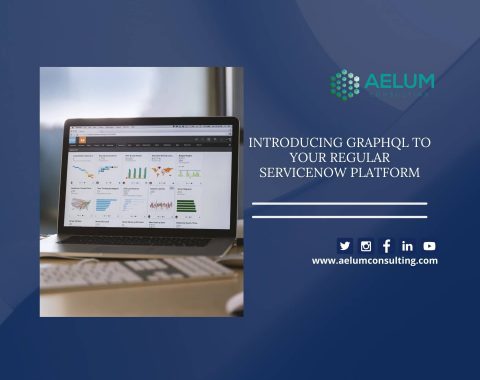Improve service delivery processes efficiency, reduce costs, enhance customer satisfaction, and achieve their business objectives by following the strategic approach with ESM.

Enterprise Service Management
Enterprise Service Management (ESM) is a framework that various organizations use to manage their service delivery processes and align them with their business goals. It aims to create a holistic approach to service management that integrates and streamlines service delivery processes across the organization. Also, it typically involves using a service management platform or software that allows organizations to manage their service delivery processes in a centralized and automated way. It encompasses IT service management (ITSM) principles and practices. Still, it extends them beyond the IT department to other areas of the enterprise, such as HR, finance, facilities, and legal.
Enterprise Service Management Framework
The following are some key components of an ESM framework:
-
Service Strategy
Defines the overall service strategy of the organization, including the service portfolio, service offerings, and service level agreements (SLAs).
-
Service Design
Focuses on designing and developing new services and processes and ensuring they align with business goals and objectives.
-
Service Transition
Focuses on implementing and deploying new services and processes and managing the associated risks and issues.
-
Service Operation
Responsible for the day-to-day management of services and processes, including incident management, problem management, change management, and service level management.
-
Continual Service Improvement
Focuses on continually improving the effectiveness and efficiency of the service delivery processes through metrics, feedback, and continuous improvement initiatives.

Enterprise Service Management Benefits
Improved Customer Experience
Allows consistent, high-quality customer services, regardless of the service department. It leads to improved customer satisfaction and loyalty.
Increased Efficiency and Productivity
Streamlines service delivery processes, reducing manual work & automating routine tasks. It improves productivity & reduces time & resources.
Better Collaboration
Promotes collaboration between departments. It provides a shared platform for managing services and enables teams to work together more effectively.
Improved Visibility and Control
Provides real-time visibility into service delivery processes, enabling them to monitor performance, identify issues, and make informed decisions.
Reduced Costs
Helps organizations reduce costs by eliminating duplicated effort, improving efficiency, and reducing the time required to deliver services.
Better Governance and Compliance
Helps to align service delivery processes with organizational policies and standards and meet compliance requirements.
Increased Agility and Flexibility
Allows organizations to respond quickly to changing business needs & market conditions by rapidly deploying new services & modifying existing ones.
Better Service Integration
Allows service integration and management across multiple departments, vendors, and providers, providing a holistic view of service delivery.
How ServiceNow ESM works?
Service Catalog
Provides a central location for users to request services, including IT and non-IT services. It can be customized to include any service the organization offers and can be tailored to specific user roles and departments.
Service Management
Manages service requests, incidents, problems, changes, and service levels. These tools help organizations manage service delivery consistently and efficiently and provide users with timely and effective support.
Automation
Used to automate routine tasks and processes, such as password resets, software distribution, and service provisioning. It helps to reduce manual effort and improve service delivery times.
Analytics and Reporting
Monitors and analyzes service performance and generates reports and dashboards. It allows organizations to track service delivery metrics, identify trends, and make data-driven decisions about service improvements.
Integration
Integrate with various third-party systems & apps, including ERP systems, HR systems, and financial systems. It manages services across business functions and departments and provides users with a seamless service experience.
Mobile App
Allows users to access services and support from their mobile devices. It helps to improve service delivery times and user satisfaction and enables users to get the support they need wherever they are.
Enterprise Service Management Examples
Here are some examples of Enterprise Service Management (ESM) in practice:
HR Service Management
Many organizations use ESM to manage HR services, such as employee onboarding, performance management, and employee support. An ESM framework can help HR teams to streamline their processes, automate routine tasks, and provide consistent and high-quality service to employees.
Facilities Service Management
ESM can be used to manage facilities services, such as building maintenance, security, and event management. An ESM framework can help facilities teams to optimize their processes, improve communication and collaboration, and deliver a better service to employees and customers.
IT Service Management
ESM is often used in IT departments to manage IT services, such as help desk support, network management, and software deployment. An ESM framework can help IT teams to align their services with the needs of the business, improve the efficiency and effectiveness of their processes, and ensure that service levels are consistently met.
Legal Service Management
ESM can also be used in legal departments to manage legal services, such as contract management, compliance, and risk management. An ESM framework can help legal teams to improve their processes, reduce risk, and provide a more responsive and proactive service to the business.
Finance Service Management
ESM can be used in finance departments to manage financial services, such as budgeting, procurement, and accounts payable. An ESM framework can help finance teams optimize processes, improve compliance, and provide better visibility and control over financial activities.
Retail
An e-commerce company could implement ESM to manage its IT infrastructure, logistics, and customer support services. ESM could also help the company to manage its HR services, such as recruiting, training, and employee engagement.
Enterprise Service Management Solutions
Service Catalog Management
ESM solutions provide a centralized service catalog listing all the organization’s services. It enables users to request services easily and ensures services are delivered consistently and efficiently.
Incident Management
ESM solutions provide a structured process for managing incidents, such as system outages or service disruptions. It helps to minimize the impact of incidents and ensure that services are restored as quickly as possible.
Problem Management
ESM solutions provide a process for identifying and resolving the root cause of recurring incidents to prevent them from happening again.
Change Management
ESM solutions provide a process for managing changes to services and systems to ensure that they are implemented in a controlled and coordinated way and do not cause unintended disruptions.
Service Level Management
ESM solutions provide a process for managing service levels and ensuring services are delivered by agreed-upon service level agreements (SLAs).
Knowledge Management
A process for capturing, organizing, and sharing knowledge about IT services, including best practices, known errors, and solutions to common issues.
How Can Aelum Consulting Help with Enterprise Service Management?
Aelum Consulting is the Premier ServiceNow Partner that can help with Enterprise Service Management (ESM) in several ways:
ESM Strategy
Aelum Consulting can help you create a strategic plan for your ESM implementation. It includes identifying your business goals, defining your service catalog, and establishing service level agreements (SLAs).
ESM Implementation
Aelum Consulting can assist with implementing your ESM solution. It includes selecting the appropriate tools and technologies, configuring the solution to meet your business needs, and testing the solution to ensure it works as expected.
ESM Training
Aelum Consulting can train your team to ensure they have the skills and knowledge necessary to use your ESM solution effectively. It includes training on best practices, tool functionality, and service management processes.
ESM Optimization
Aelum Consulting can help you optimize your ESM solution. It includes identifying areas for improvement, making configuration changes, & providing ongoing support to ensure the solution continues to meet your business needs.
ServiceNow Platform for Enterprise Service Management
IT Service Management
ServiceNow ITSM provides a range of capabilities to manage IT service delivery processes, including incident management, change management, problem management, and asset management.
IT Operations Management
ServiceNow ITOM provides a range of capabilities to manage IT infrastructure and operations, including discovery and dependency mapping, event management, and cloud management.
Customer Service Management
ServiceNow CSM provides a range of capabilities to manage customer service and support processes, including case management, omnichannel support, and knowledge management.
Human Resources Service Management
ServiceNow HRSM provides a range of capabilities to manage HR service delivery processes, including case and knowledge management, employee self-service, and onboarding and offboarding.
Integration Hub
ServiceNow Integration Hub provides a range of capabilities to integrate with other enterprise systems, including pre-built connectors, integration workflows, and data mapping tools.
Frequently Asked Questions
ServiceNow Enterprise Service Management (ESM) is a set of tools and processes designed to help organizations manage their service delivery operations. It provides a single platform for managing all enterprise services, including IT, HR, finance, facilities, and more.
Some of the benefits of using ServiceNow ESM include improved efficiency, faster service delivery, increased transparency, improved customer satisfaction, and reduced costs.
ServiceNow ESM can be used to manage a wide range of enterprise services, including IT services, HR services, financial services, facilities services, and more.
ServiceNow ESM can be integrated with other enterprise systems using APIs, connectors, and other integration tools. It allows organizations to streamline service delivery operations by automating workflows and sharing data across systems.
ServiceNow ESM is licensed on a per-user basis. Organizations can choose from a variety of licensing models, including user-based, device-based, or service-based licensing.
ServiceNow provides a variety of training options for users, administrators, and developers. These include instructor-led classes, self-paced online courses, and virtual labs.
ServiceNow ESM can be customized using the ServiceNow platform’s built-in configuration tools and development frameworks. It allows organizations to tailor the solution to their specific business needs and processes.
Our Clients


























































